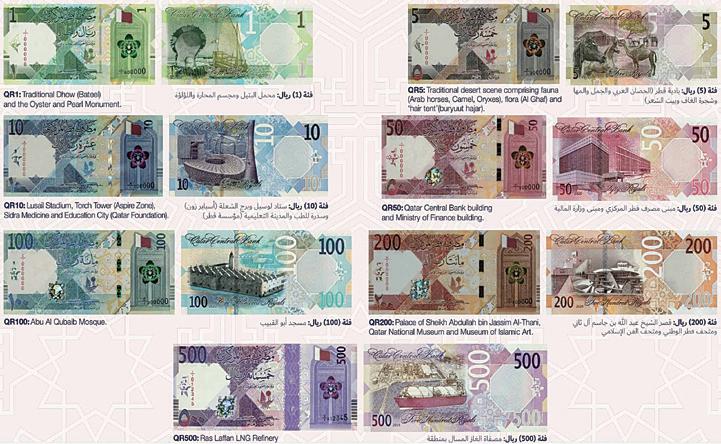
3 minute read
Multaqa (Student Center
Currency
The unit of currency is the Qatari Riyal (QAR), divided into 100 Dirhams (Dh), issued by Qatar Central Bank (QCB). It is pegged to the US dollar at a fixed exchange rate of USD1 = QAR3.64. The fifth series of notes were introduced in December 2020. A new QAR200 note joins the QAR1, QAR5, QAR10, QAR50, QAR100 and QAR500 notes. The old notes cease to be legal tender on 31 December 2021, although the public are able to change the old notes at Qatar Central Bank for another 10 years. Banknotes incorporate security threads, as well as special features for recognition by the blind and visually impaired, and the new QAR500 note features a holographic security thread, the first in the Middle East to do so. Coins remain unchanged at Dh5, Dh10, Dh25 and Dh50. Four GCC countries support the creation of a Gulf Monetary Union (GMU) – Qatar, Saudi Arabia, Kuwait and Bahrain; the UAE and Oman have withdrawn entry. The GCC Supreme Council in 2008 approved the Monetary Union Agreement and the Statute of the Monetary Council. The headquarters of the Gulf Monetary Council opened in Riyadh in 2013 with monetary union proposed later in the year. Qatar, Kuwait, Bahrain and Saudi Arabia subsequently agreed to establish a unified central bank with currency pegged to the USD. There has been no further action since 2013.
The Banking Sector
Overseen by Qatar Central Bank (QCB), the sector comprises a number of regional, foreign and Islamic banks. State-owned Qatar Development Bank provides financing to SMEs, while QInvest focuses on investment banking, asset management and investing its own capital. Barwa Bank and International Bank of Qatar (IBQ) signed a final agreement in August 2018 to merge the two banks, the first in Qatar's banking history, to create a Sharia-compliant financial institution with more than USD22 bn in assets. The legal merger was completed in April 2019, trading as Barwa Bank, with IBQ products converted to Sharia-compliant equivalents. Barwa changed its name to Dukhan Bank in October 2020. June 2020 saw negotiations open for another merger, between Masraf Al Rayan and Al Khalij Commercial Bank (al khaliji). Masraf Al Rayan was previously involved as a third bank in the merger between Barwa Bank and IBQ. Masraf Al Rayan and al khaliji entered into a merger agreement in January 2021, formally completed in November 2021. al khaliji's business has now been absorbed into Masraf Al Rayan's. The latter will be the remaining legal entity operating in accordance with Islamic Sharia principles, and is now one of the largest Sharia-compliant banks in Qatar and the region, with over QAR182 bn in total assets. The Cabinet approved a draft resolution in December 2021, allowing a non-Qatari investor to own up to 100% of the capital in four banks: Commercial Bank of Qatar, Masraf Al Rayan, Qatar Islamic Bank, and Qatar National Bank. A new loan-to-deposit requirement of 100% came into effect in 2018. The adoption of International Financial Reporting Standard (IFRS) 9 by QCB has strengthened the provision coverage at Qatar’s commercial banks – under the IFRS standard, banks and financial entities have to set aside a certain proportion of profit against losses for unseen reasons. QCB set up the Supreme Emergency Committee in 2018 to monitor the day-to-day activities of financial institutions in the country, addressing emergency matters and easing the flow of work. Both the Institute of International Finance and the Economist Intelligence Unit have noted that Qatar's banking system 'remains resilient' during the COVID-19 pandemic. The ability to fully service its debt obligations is good, thanks to ample foreign reserves and the assets of sovereign wealth fund Qatar Investment Authority (QIA).
Qatar Central Bank
Under Law No 13 of 2012 Qatar Central Bank and the Regulation of Financial Services, QCB is deemed an autonomous corporate body, with a capital of QAR50 bn and under the direct control of The Amir. It is headed by a governor appointed by The Amir, and primary goals include financial stability, supporting developmental activities and strengthening the national economy. The law is not just for banks, but includes insurance companies, exchange houses, Qatar Exchange and QFC-registered entities. In November, Amiri Decision No 65 of 2021 appointed HE Sheikh Bandar bin Mohammed bin Saoud Al Thani as Governor of QCB.




